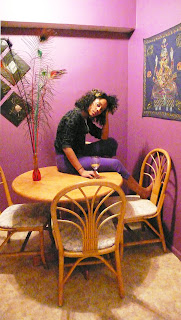 Mayaba and Mandisa, both young women active in the New Orleans branch of INCITE, meet up with us on Esplanade for late afternoon coffee. Mayaba, 27, is from DC and has been in New Orleans for 6 years. She works with INCITE, the New Orleans Women’s Health Clinic, and Critical Resistance, an organization against the prison industrial complex. “The complex needs sexism, racism, classism, and heterosexism in place, or else people would realize that locking people up is not about safety, it’s about money,” Mayaba says. “In New Orleans, if you look at the rebuilding, they are just more cops, they are rebuilding a new jail, and meanwhile kids aren’t getting educated.” CR is now working on getting amnesty for prisoners whose cases were affected by Katrina.
Mayaba and Mandisa, both young women active in the New Orleans branch of INCITE, meet up with us on Esplanade for late afternoon coffee. Mayaba, 27, is from DC and has been in New Orleans for 6 years. She works with INCITE, the New Orleans Women’s Health Clinic, and Critical Resistance, an organization against the prison industrial complex. “The complex needs sexism, racism, classism, and heterosexism in place, or else people would realize that locking people up is not about safety, it’s about money,” Mayaba says. “In New Orleans, if you look at the rebuilding, they are just more cops, they are rebuilding a new jail, and meanwhile kids aren’t getting educated.” CR is now working on getting amnesty for prisoners whose cases were affected by Katrina.
Mandisa, 22, born in New York, moved here when she was 10. Through her work at INCITE, she also got involved with the Women's Health Clinic and Women's Health and Justice Initiative, and now is "a budding sexual health literacy organizer." Mandisa also worked in public housing in New Orleans when the Storm hit, which, as she tells us, "got coopted by white people. Public housing [inhabitants] in New Orleans were mostly black women and children. I have a serious problem with the white male taking the lead on this struggle. You can sit in the back and be an ally, but you can't just lead the movement."
INCITE's emphasis on the overlap of gender and race made Mandisa realize that "women of color are the ones who lie in this crazy intersection of vulnerability and violence." After the Storm, she found that people were talking plenty about race and class, but not gender. "I saw myself on TV every day, I saw black women from the ages of 5 and 50. Yet there was no gender analysis of this storm? That was painful." Mandisa describes the women involved in these projects as "center[ing] the experiences of women of color in post-Katrina New Orleans and being committed to rendering ourselves visible." Mayaba adds, "When they shut down public housing, there was an 83 percent drop of female head-of-households in New Orleans, mostly low-income, mostly black. Now, the government is denying the fact that black women are back here, and they block federal grants and money to help this population. So the Women's Health Clinic is a point of resistance in itself…saying, 'Look, we're getting people in and providing these services…there is a need.'"
in post-Katrina New Orleans and being committed to rendering ourselves visible." Mayaba adds, "When they shut down public housing, there was an 83 percent drop of female head-of-households in New Orleans, mostly low-income, mostly black. Now, the government is denying the fact that black women are back here, and they block federal grants and money to help this population. So the Women's Health Clinic is a point of resistance in itself…saying, 'Look, we're getting people in and providing these services…there is a need.'"
Both women consider themselves feminists, but not without qualifiers. "I identify as a queer black radical feminist," Mandisa (right) says. "Feminism should not be devoid of race or ethnicity." Also, "If you can't see the ideals of capitalism as oppressive, you ain't a feminist. Until we see that white supremacy and capitalism and patriarchy are all intertwined, then I question your gender politic." Mayaba agrees. "I'm a black radical feminist…and an anarchist on a given day," she says. Mayaba felt at age 14 that "something was not right." She was introduced to feminism through the white mainstream, mentioning Susan Faludi's Backlash as one of the first feminist texts she ever read. But most of it "left me stuck because it left race out of the picture." Mayaba thinks, like Mandisa, that white supremacy above all needs to be challenged. "I'm not going to focus on forming feminism when we have this massive problem. Things are really oppressive right now."
As both ladies realize they need to leave shortly, one of Mandisa's earlier comments sticks in my mind: "I know a lot of people put a lot of emphasis on how we identify. But at the same time I'm just like, 'Fuck! Just do the work.'"
--Nona
 Erica Jong (above, in her East side home): New Yorker, novelist, poet, media personality, pioneer of the sexual revolution, Second Wave feminist.
Erica Jong (above, in her East side home): New Yorker, novelist, poet, media personality, pioneer of the sexual revolution, Second Wave feminist.











































